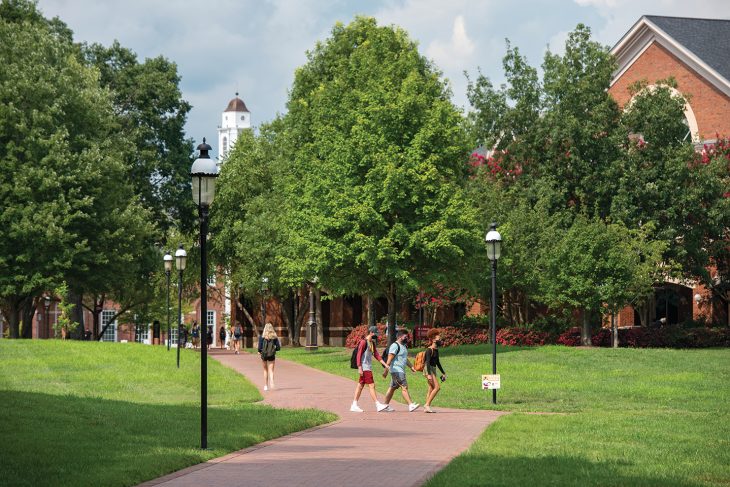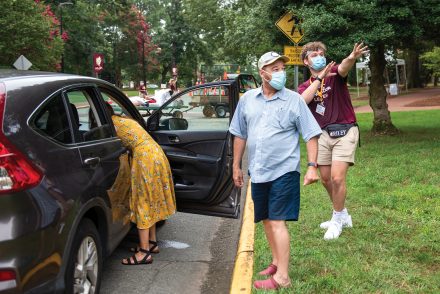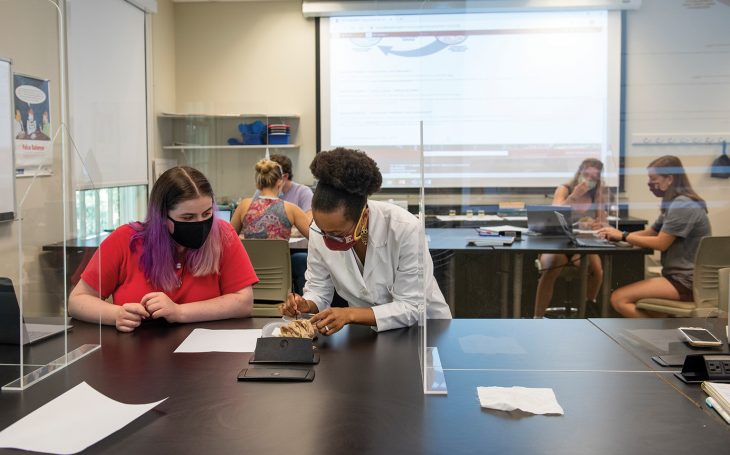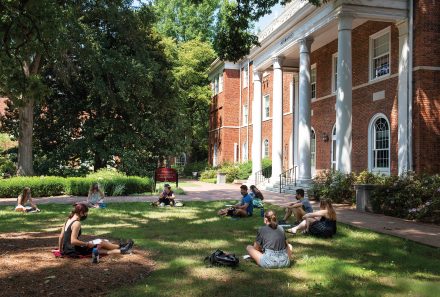The fall offered new lessons for the Elon community as the university implemented a plan that balanced health and safety with meaningful educational experiences amid the pandemic.

Even before the first car carrying a member of the Class of 2024 pulled into the Schar Center parking lot to check in on the morning of Aug. 14, it was clear this fall semester at Elon would be one for the history books. While people around the world were adapting to life during the COVID-19 pandemic, Elon was changing, too, to help ensure a safe and healthy return to campus for nearly 9,000 students, faculty and staff. Months of preparations in late spring and throughout the summer helped prepare the campus for a semester unlike any other.
“As we launch the 2020-21 academic year, our newly staged campus is filled with the typical energy and excitement of a new beginning,” President Connie Ledoux Book said in a message to students to start the year. “This year it is also filled with resolve to meet the challenges that lie ahead. We are confident because of the extraordinary efforts this summer by faculty and staff to prepare the campus and the curriculum for the beginning of a new era in higher education.”
Elon adopted a condensed semester that saw classes resume in mid-August with in-person learning. Coursework will end before the Thanksgiving holiday, and final exams will be taken remotely. Students and faculty have participated in a variety of in-person, blended and remote learning models designed to incorporate the same engaging and experiential elements that make an Elon education unique while promoting physical distancing and healthy practices. Campus life shifted as well, with fewer in-person events and new opportunities to build community and connect in small groups and remotely.
In September, the Elon community responded quickly to several on-campus clusters of positive cases, adding new measures such as visitor restrictions in university housing, grab-and-go dining and recommendations against non-essential travel. The community’s determination and willingness to comply with the updated procedures had an immediate impact, with the number of cases declining and the university lowering its COVID-19 alert level. It’s been a semester of lessons learned, challenges overcome and new experiences that have bound members of the university together even as the pandemic forced many to be physically apart.
Moving in
On the first of two Move-In Days in the fall, the cheers and welcomes were slightly muffled by cloth masks and other face coverings as new students arrived on campus. Face coverings weren’t the only difference, as Elon adapted its finely tuned move-in process to encourage physical distancing and reduce crowding in parking lots and residence halls. New checkpoints and protocols were in place to help promote a healthy and safe start to the semester, with all new students starting the process with a health check-in at Schar Center.
While Elon’s Ready & Resilient Plan led to an unconventional move-in process, the day’s significance remained, with more than 1,600 first-year and transfer students arriving to settle into their new homes and begin a transition into their college careers at Elon. The university’s mission remained grounded in the emphasis on teaching and learning and supported by a culture of collaboration and innovation.

At Schar Center that Friday morning, a stream of cars, trucks and SUVs made stops at tents to begin the check-in process. Students and their family members had their temperatures checked, and Elon staff members verified that first-year students had completed the required steps to move in. Those included completing both a pre-semester COVID-19 test and online training modules, submitting vaccination records and signing the Healthy Elon Commitment, which asked students, faculty and staff to pledge to protect their health and that of others on campus. They also received a kit that included an Elon-branded mask, hand sanitizer, tissues, a thermometer and other information about steps students could take to promote health and safety on campus.
“I’m just so excited to meet new people, despite all that is going on,” said Michael Buccellato of Chicago as he moved into his room in Global Neighborhood. He and his mother, Cassie Buccellato, added a stop at Elon to a college-visit trip to North Carolina last school year. Both said things clicked as soon as they arrived on campus for a tour. “I am so excited for him to embark on this new chapter in his life,” Cassie said. “I am way more excited than I am anxious.”
Classes get underway
The semester officially commenced on Aug. 19, with students and faculty settling into reconfigured and creative learning environments. This followed a summer during which classroom spaces were reimagined and outfitted with cleaning supplies, and faculty adapted their courses to address the challenges presented by the pandemic. Tents were erected around campus to provide additional classroom space, and locations such as McKinnon Hall and Lakeside meeting rooms were put into service as “surge” classrooms. For instance, Associate Professor of Journalism Rich Landesberg’s COM100 course met for the first time in the 230-seat Turner Theatre in Schar Hall, with at most three students to a row.

The number of desks in classrooms was reduced to reinforce occupancy limits, with desks spaced out to adhere to physical distancing recommendations. Each classroom has a sanitizing station equipped with hand sanitizer, sanitizing spray and wipes. Students entering Assistant Professor Titch Madzima’s Exercise Physiology course on the first day of class stopped by the hand sanitizing station before heading to their desks, which they wiped down with sanitizing wipes when class concluded. Madzima noted the use of masks made it more challenging to identify his students, as well as to tell when people were smiling, but underscored the importance of this new way to engage in the classroom. “Let’s all take care, and look out for each other,” Madzima told the students. “This semester as we need to make adjustments, we’ll make adjustments.”
Classrooms were also equipped with cameras to allow for remote participation and for the recording of class sessions. That has enabled faculty members to rethink how their students learn together, with many designing blended classes that have students alternating in-class and remote learning. “A lot of faculty members have been thinking through what technological tools make the learning experience rich and help meet the learning outcomes,” said Deandra Little, assistant provost and director of the Center for the Advancement of Teaching and Learning. “That can mean using those tools to bring in-class and out-of-class students together.”
Many faculty members adapted their courses to include both online and in-person elements in a hybrid or blended approach to instruction. Once a rarity at Elon, hybrid classes are now common, with more than 70 percent of courses incorporating an online component in some way. Often, faculty members are integrating new technological tools into their courses with help from Teaching and Learning Technologies and a range of resources offered throughout the summer.

At Elon, hybrid instruction takes place in many forms. Most commonly, it means splitting a larger course in two, with half of the class attending each session and half connecting remotely at the same time. This synchronous approach allows all students to meet at the same time and provides for adequate physical distancing within the classroom. Everyone participating in the in-person session wears masks, and the number of desks in each classroom has been reduced, with the desks spaced out around the room. Faculty members typically stream and record each session using a videoconferencing platform, and students rotate each session between being in class and connecting remotely. Often a student in class will serve as a connection between the two cohorts, relaying questions or comments from those connecting remotely.
Another approach is a “flipped” classroom model that has students watching videos of their professor when they are not in the classroom, and then using the time in class to work collaboratively and put the material they learned in the videos to practical use. That’s an approach Assistant Professor of Finance Margarita Kaprielyan adopted in two of her courses that rely heavily on technology. “One of the challenges I found teaching technical courses is that the pace is really important,” she said. “They can follow along with me in the videos, and then rewind depending upon how well they are grasping the ideas. It makes it more accessible.”
Virtually connected
With the requirements of physical distancing and the restrictions on larger in-person gatherings, many traditional events shifted online or were dramatically reconfigured. While that’s meant fewer personal interactions at events like Homecoming & Reunion Week, Family Fall (formerly Family Weekend) and the wide variety of offerings on the cultural calendar, it’s also provided the opportunity for greater participation by the broader Elon community as they can tune in and connect virtually.
Elon’s lineup of speakers for the fall included thought leaders such as author Jennifer Eberhardt, who wrote “Biased,” this year’s Common Reading selection; historian and author Ibram Kendi, a leading anti-racist voice; presidential historian Douglas Brinkley; and poet Nikki Giovanni. The calendar included musical performances by Naturally 7, John McCutcheon and the Williamsburg Salsa Orchestra as well as productions by the Second City Comedy Troupe and the Department of Performing Arts. The pandemic meant a shift online for these cultural offerings, but presented new opportunities for Elon students, faculty, staff, alumni and friends to engage and opened up an opportunity for participation by those who would not have been able to attend an in-person event on campus.
“We’ve learned our community is strong, united and determined to protect one another. We’ve learned that lots of planning, attention to detail and thinking carefully about these challenges has paid off.”
Plans are underway for Elon’s Winter Term and spring semester, as the university continues to adapt to the pandemic and promote a healthy and safe campus experience. Athletics competitions slated for the fall were canceled, with Elon Football and the CAA gearing up for a shorter season in the spring. The university is exploring the possibility of a May Term — also known as a warmer Winter Term — that could allow students to pursue study abroad opportunities they may have otherwise participated in during January had the pandemic not impacted those plans.
The campus community remains optimistic that by working together, innovating and remaining vigilant, the 2020-21 academic year will go down in history as a unique but ultimately successful year for Elon. “Like most new experiences, we’ve learned more than we could have imagined,” President Book said in a message to the community in the fall. “We’ve learned our community is strong, united and determined to protect one another. We’ve learned that lots of planning, attention to detail and thinking carefully about these challenges has paid off.”


